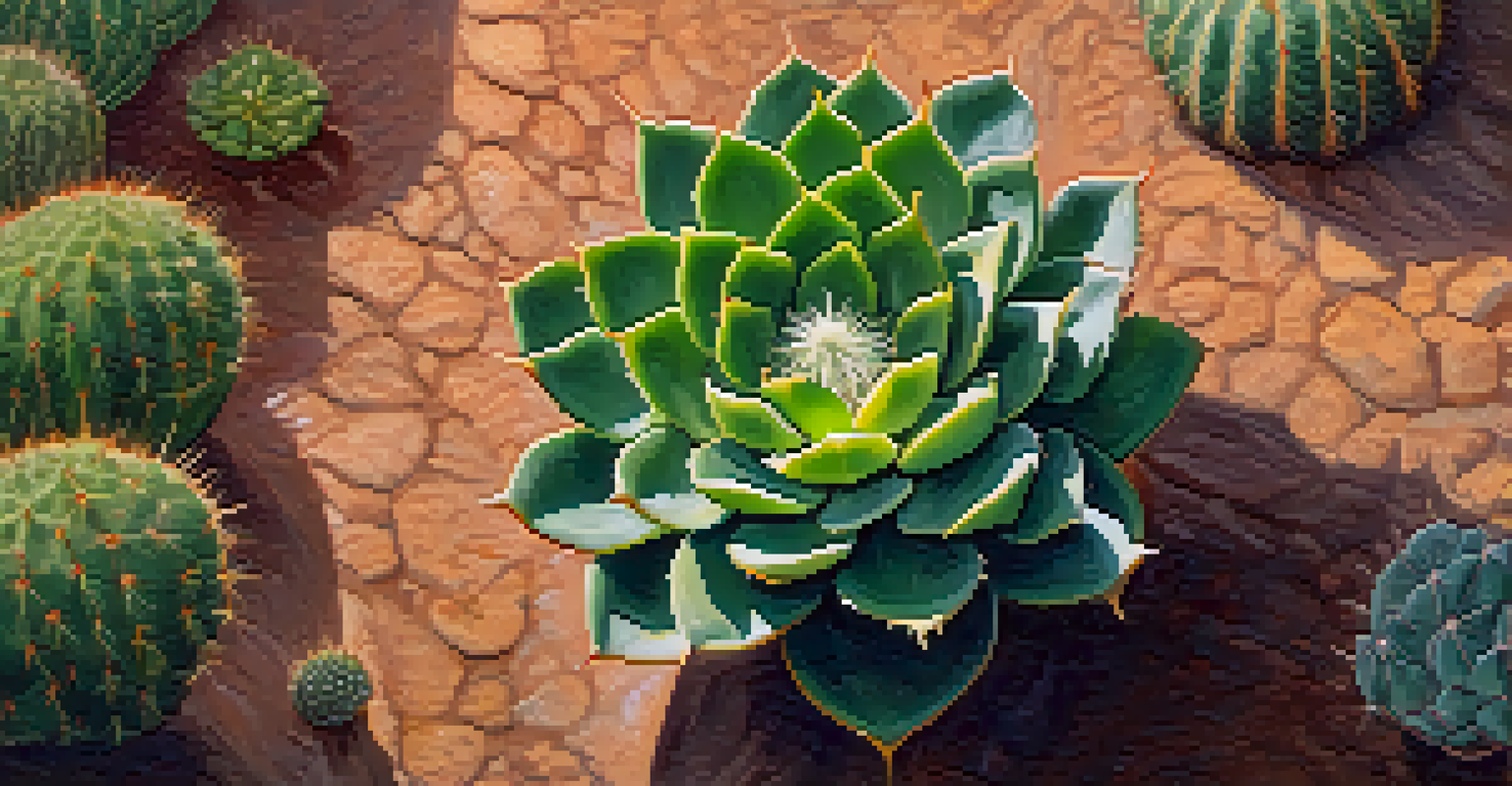Peyote and Its Connection to Spiritual Emotional Healing

Understanding Peyote: A Sacred Plant
Peyote is a small cactus native to Mexico and the southwestern United States, known for its psychoactive properties. It has been used for thousands of years by Indigenous peoples for spiritual and healing purposes. The active compound, mescaline, alters perception and can lead to profound experiences that many describe as transformative.
The cactus is not just a plant; it is a sacred gift from the earth, integral to our spiritual practices.
For many Indigenous cultures, Peyote is not just a plant but a sacred gift from the earth, integral to their spiritual practices. It is often consumed during ceremonies that aim to connect individuals with their inner selves and the universe. This connection can lead to deeper insights and emotional clarity for those who participate in these rituals.
As interest in alternative healing methods grows, Peyote has garnered attention beyond its traditional use. People are increasingly exploring its potential benefits for emotional healing and spiritual enlightenment. However, it’s essential to approach this sacred plant with respect and understanding of its cultural significance.
The Role of Peyote in Indigenous Healing Practices
Indigenous tribes such as the Huichol and the Navajo have long recognized the healing power of Peyote. These communities incorporate it into their rituals, believing it can mend emotional wounds and restore balance. The ceremonies often involve music, dance, and communal support, enhancing the healing experience.

During these ceremonies, participants often share personal stories, fostering a sense of community and empathy. This shared experience can be powerful, allowing individuals to confront their emotions and find solace in the support of others. It's a reminder that healing is often a collective journey rather than a solitary one.
Peyote's Cultural Significance
Peyote is a sacred plant for Indigenous cultures, integral to their spiritual practices and healing ceremonies.
The integration of Peyote into these healing practices highlights the importance of spirituality in emotional well-being. Many individuals report feelings of interconnectedness and understanding, which can be crucial for those struggling with mental health issues. This underscores the idea that emotional healing can be deeply rooted in spiritual experiences.
Psychoactive Effects and Emotional Insights
The psychoactive effects of Peyote can lead to altered states of consciousness, which many users describe as a profound journey inward. During these experiences, individuals may confront their fears, traumas, and emotional blockages, often leading to significant insights. This process can be likened to peeling back layers of an onion, revealing deeper truths about oneself.
Psychedelics can serve as a mirror, reflecting back the emotions and thoughts that may have been buried or ignored.
Many participants report feelings of euphoria, peace, and a sense of connection to nature and the universe. These heightened emotional states can facilitate breakthroughs that might not occur in everyday life. It’s as if Peyote acts as a mirror, reflecting back the emotions and thoughts that may have been buried or ignored.
However, it's important to approach these experiences with caution. Not everyone will have the same reaction, and some may face challenging feelings that arise during their journey. Having a supportive environment and a guide can help navigate these complex emotions, making the healing process more effective.
Scientific Perspectives on Peyote and Healing
Recent studies have begun to explore the therapeutic potential of Peyote and its active component, mescaline. Researchers are investigating how these substances can aid in treating conditions like PTSD, depression, and anxiety. This scientific interest aligns with traditional beliefs about the plant's healing properties, creating a bridge between ancient wisdom and modern medicine.
Early findings suggest that mescaline may help individuals process traumatic memories and emotions, leading to enhanced emotional regulation. This aligns with anecdotal reports from those who have participated in Peyote ceremonies, highlighting its potential for therapeutic use. However, more research is necessary to fully understand the benefits and risks involved.
Therapeutic Potential of Peyote
Recent studies suggest that Peyote and its active compound, mescaline, may aid in treating mental health conditions like PTSD and depression.
It's essential to note that the use of Peyote outside of traditional contexts can raise ethical and legal concerns. As interest in psychedelics for mental health grows, understanding the importance of cultural respect and the significance of these practices in Indigenous communities becomes crucial. Responsible use should always prioritize the well-being of individuals and the integrity of cultural traditions.
Personal Stories: Healing Journeys with Peyote
Listening to personal stories from those who have experienced Peyote can provide valuable insights into its healing potential. Many individuals share transformative journeys where they found clarity, forgiveness, and emotional release. These stories often highlight how Peyote helped them confront pain and foster personal growth.
For example, one participant described how Peyote allowed them to revisit a traumatic event from their past, leading to feelings of liberation and understanding. This process can be incredibly cathartic, enabling individuals to let go of burdens they have carried for years. Such anecdotal evidence reinforces the idea that Peyote can serve as a powerful tool for emotional healing.
These narratives also emphasize the importance of the setting and community when engaging in Peyote ceremonies. Many participants feel safe and supported, which enhances the healing experience. This sense of belonging can be invaluable, reminding us that healing often flourishes in connection with others.
Challenges and Considerations in Peyote Use
While Peyote offers potential benefits, there are challenges and considerations to keep in mind. For starters, the legality of Peyote varies by location, and it is often protected under Indigenous rights. Understanding and respecting these regulations is crucial for anyone considering its use for healing.
Additionally, not everyone may react positively to Peyote. Some may experience anxiety, confusion, or unpleasant emotions during their journey. It’s essential to approach the experience with careful consideration and ideally under the guidance of someone experienced in Peyote ceremonies.
Challenges in Peyote Use
While Peyote offers healing benefits, considerations such as legality, individual reactions, and integration of insights are crucial for safe use.
Moreover, integrating the insights gained from a Peyote experience into everyday life can be challenging. Many people find that the emotional breakthroughs they experience during their journey require ongoing reflection and support. It's vital to have a plan for continued healing and integration after the experience to ensure lasting benefits.
The Future of Peyote in Healing Practices
As interest in alternative healing practices continues to rise, Peyote's role in emotional and spiritual healing is likely to evolve. More people are seeking holistic approaches to mental health, and Peyote offers a unique perspective on healing that combines spirituality with emotional exploration. This growing recognition could lead to increased access to traditional practices.
However, it's critical to balance this interest with respect for Indigenous cultures and their traditional practices. Discussions about the future of Peyote must include Indigenous voices to ensure that their wisdom and rights are honored. Collaborative efforts can help create a more inclusive approach to holistic healing that benefits everyone.

Looking ahead, education about Peyote's significance and therapeutic potential will be essential. As more research emerges, we can better understand how this sacred plant can contribute to emotional healing while maintaining respect for its cultural roots. The future may hold promising possibilities for integrating Peyote into broader healing practices.